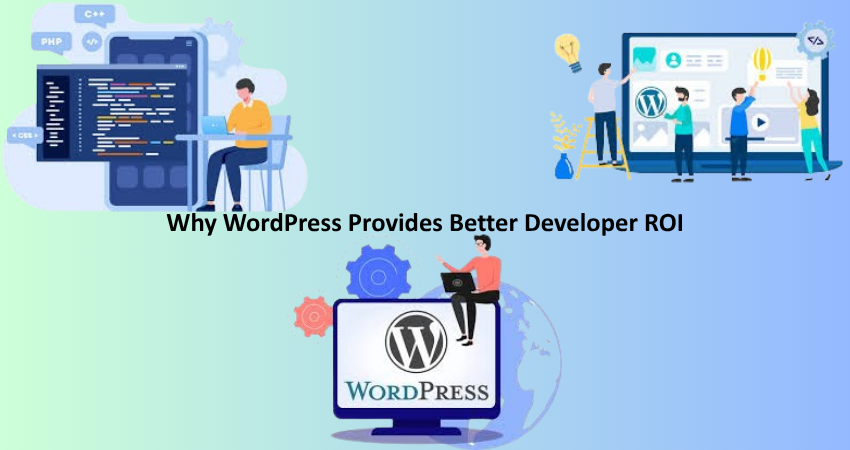
Introduction
In a very competitive and volatile market for web development, the right platform may drive success and profit in any given project. Thus, for a developer, ROI stands for much more than financial measurements-it translates into saved time, scalability of solutions, community support, and flexibility in producing excellent work at little resource consumption. WordPress has carved out its name as one of the most trusted, efficient, and high-ROI platforms for developers at every level of experience. Its mix of personable features and an extensive ecosystem of add-ons with a robust community makes it the perfect choice for getting the work done with the least input.
WordPress is more than just a CMS; it is a full-fledged development framework and, as of now, powers over 40% of the web. The ubiquitous nature of WordPress thus ensures the need for capable developers in the long run. The completely customizable and open-source nature of WordPress also gives a really clean interface for back-end development and client handover. Whether you are a freelancer, agency developer, or part of an enterprise team, you really benefit from this platform with faster development cycles, lower maintenance costs, and happier clients. This article delves into reasons WordPress gives better developer ROI; it talks about the efficiency of WordPress, its scalability, the support ecosystem, and the overall value proposition.
WordPress Simplifies Development Workflows
Pre-Built Themes and Plugins Accelerate Project Timelines
The biggest edge that WordPress has over all the other platforms is its availability of pre-packaged themes and plugins. These can save a lot of time during the development process and allow developers to leap over many of the initial steps repeatedly when embarking on a new project. As a result of this time savings, they end up spending less time coding template projects that include things like contact forms, image galleries, and SEO tools. They can ultimately take on more clients and create them faster without compromising quality.
Thirdly, a premium theme and plugin set like Elementor, Astra, or WooCommerce provides very advanced functionality without requiring a lot of coding. With them, even the integrated features that often require huge investment in development costs can thus be made available by a developer at an incredibly lower cost. They will allow for the same performance and design standards across multiple projects. In a freelancing or agency setup, this leads quickly to improved satisfaction and repeat business. All this again translates into increased ROI.
User-Friendly Dashboard Minimizes Client Support Requirements
Another reason contributing to WordPress’s ROI advantage is its simple and convenient admin dashboard. After the delivery of a project, clients can manage their content updates, publish blogs, or change settings as they like without requiring developer intervention any time soon. This means more time for developers like us to do other projects and less time for post-launch support and training. Even non-technical users can pick up the system pretty quickly, which means no costly supporting contracts and fewer follow-up requests.
The embedded content management tools are made as simple as possible so that clients can use WYSIWYG (What You See Is What You Get) editors to see changes as they happen. Developers can also entail custom roles and permission settings to restrict what can be modified by clients, adding a level of integrity for the site. Such ease of use garners confidence from developers and lasting goodwill from their clients, both of which, in turn, translate into new business and referrals, which feeds directly into the common ROI.
Cost-Effectiveness Enhances Financial Returns

Open-Source Framework Reduces Upfront Investment
WordPress has an open-source nature turning into a benediction for developers who are targeting the low-cost solutions with good profitability. The platform is highly downloadable, ably installed, and well used without the need to pay for licensing fees or incur any hidden charges. This is in contrast to proprietary CMS platforms that normally come with annual fees, which are chargeable per user. WordPress is hugely beneficial to those developers dealing with multiple client projects or who have started a development business.
Just the software alone, let’s say, one can come up with fully functional looking websites-and this, in effect, has been easily available for free and cheap themes and plugins for developers to cut a very tight budget in finalizing website creations for clients. Of course, this attracted other clients and return investment within the boundaries of realistic project costs would be a very good part of very high ROI. Therefore, combined with its scalability, WordPress is capable of bringing to market anything from systems created on small budgets to enterprise-scale offerings and everything in between.
Reduced Maintenance Costs Over Time
Potential maintenance forms an essential part of a web development project, wherein WordPress is considered to be the best at bringing down such costs over a longer span. In fact, most of the maintainable tasks, including security updates, backups, and performance optimizations, can be automated or managed from third-party services, owing to the matured plugin ecosystem and wide hosting support. Developers thus expend a minimum time and effort in carrying out the repetitive ongoing support, which keeps them busy in more value-added projects.
In fact, regular updates from the WordPress core team ensure the platform works properly on standards and safety criteria related to modern web development. Once the maintenance is predictable and well managed, developers can offer support packages to clients who are both profitable and affordable. Ultimately, there’s a revenue stream that is self-perpetuated, with a minimum of effort going into ongoing maintenance, thus score on the very high ROI that WordPress provides.
Scalability and Flexibility Support Diverse Projects
Suitable for Projects of All Sizes and Complexity
WordPress is very versatile, accommodating simple blogs and enterprise websites, even extensive e-commerce portals and sophisticated web applications. This versatility allows developers to fairly consider using the same technology stack to service an extremely varied clientele without a dramatic increase in complexity of learning to do so or significant decrease in speed of development. Great efficiency and consistent results are obtained through reusing code, tools, and workflows across various project complexities.
A knowledgeable user can stretch WordPress far beyond its original intent. By creating custom post types and taxonomies integrated with REST APIs, WordPress qualifies as an elaborate framework that allows the building of hefty applications like membership sites, forums, or CRM systems. This way, developers do not have to learn to handle frame switching for different use cases, thus increasing productivity and giving good value for the time spent learning this particular platform.
Easily Integrates with Modern Web Tools and APIs
Integration capabilities thus reinforce WordPress as one of the most highly ROI platforms available. Developers can easily integrate their own WordPress sites with third-party APIs, analytics platforms, payment gateways, customer relationship management (CRM) systems, and others. Websites can really gain features without requiring so many rigorous backend development expenditures.
Further, the availability of modern tools such as Advanced Custom Fields (ACF), WP-CLI, and headless CMS implementations make WordPress fit for newest workflows. Developers can employ JavaScript using frameworks such as React or Vue and integrate these with WordPress under REST API or GraphQL, leading to very customized experiences for users. Ultimately, the ability to integrate WordPress with modern stacks is what keeps the developer’s skill relevant and maximizes the value of the platform. Thus is client satisfaction at its highest; the realization of ROI per project is stronger.
Strong Community and Learning Resources
Extensive Documentation and Tutorials Accelerate Learning Curve
The strength of the WordPress community is one of its most valuable assets for the developers. There exists a plethora of tutorials, documentation, forums, and online courses that enable new developers to learn the platform in a short time, while providing established developers opportunities to collect further skills. This massive database of great knowledge truly cuts down on onboarding time for new developers as well as for quick problem solving during development.
Both free and premium training centers teach subjects ranging from design theme development, plugin customization, performance tuning, and security best practices. Instead of debugging for hours, developers can find solutions that have been tried and tested within the community. Time spent on testing is eliminated, allowing developers to pursue the remainder of the project in an expedient manner, which enhances their ROI directly.
Active Forums and Meetups Offer Peer Support and Collaboration
Besides the online platforms, WordPress has built close-knit global communities through forums, social media groups, Slack groups, and local meetups. Hence, it enables developers to connect, find partners to work with, and share feedback on their projects instantaneously. For freelancers and one-man-band developers, an access to an informed colleague group can turn the tide from stagnancy to continuing development.
Meetups and WordCamps (conferences for WordPress) are held in many locations all over the world, where experiences can be shared, new tools discovered, or trending news learned. Being part of an active community keeps developers on top of best practices, innovative monetization strategies, and increased visibility in the market. So, this synergistic growth is a long-term boon to the developer, allowing maximum extraction value of time and that of skill.
Built-In SEO Advantages Strengthen Market Value

Out-of-the-Box Optimization Features
WordPress comes with many built-in features that can help developers provide clients with SEO-ready websites without a lot of fine-tuning. Customizable permalinks, clean HTML output, and responsive themes are just some of the features that ensure sites can be found by search engines. These machine interfaces save a developer a lot of manual time from the creation of sites while keeping quicker delivery times and quality intact.
This is where some well-known SEO plugins, like Yoast SEO and All in One SEO, prove to be extremely functional by implementing SEO best practices such as metadata description handling, keyword optimization, and XML sitemaps. The burden of carrying out these tasks through WordPress saves developers countless hours while boosting the performance of their websites. A built-in level of SEO friendliness is more effortless to show the value of to clients, consequently raising developers’ status for creating high-performance sites.
Client-Friendly SEO Tools Increase Retention
Clients enjoy having a-little control over their SEO without calling a developer each time for a change. WordPress gives them simple interfaces for editing meta tags, redirect management, and content readability checks. That independence fortifies client-developer relations and also reduces the amount of support requests around SEO.
Clients will now return to work or hire them for work in the future when the tangible evidence is shown by these tools—for example, good search rankings or increased traffic. Furthermore, the provision of measurable improvement with minimum effort from developers will thus support the ROI advantage of WordPress even further and further cement the position of developers as trusted, valuable partners.
Conclusion
When rating development platforms for their long-term promise, WordPress consistently shows up among the highest return on investment choices. Ease of use, affordability, and scalability, along with stable community support, comprise a development ecosystem that maximizes output and minimizes cost. Independent contractors and freelance professionals and larger agencies find that WordPress provides project efficiency, flexibility for client diversification, and prospects for long lasting sustainable development careers.
Use this large platform ecosystem to leverage modern tooling and with the active community to keep developers competitive and formfitting in this fast-paced industry. Superior ROI is also seen from the time that can be saved, consistent quality that can be delivered, and stronger relationships with clients. Today when the nomenclature is speed, reliability, and adaptability, WordPress is a go-to strategy for every developer to increase their significance and profitability.